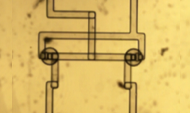TheraME! began with an idea, to make targeted personalized therapy readily available and affordable to ALL cancer patients in the clinic and to change the way ex vivo drug testing is performed, using game-changing proprietary microfluidic technology and machine learning algorithms.

2010
Platforms combining microfluidic valves and droplets have been developed at the European Molecular Biology Laboratory (EMBL) in Heidelberg in the lab of Prof. Christoph Merten. A first patent application on the core technology was filed in 2011 (US patent US20140332083A1; patent now granted) and two further patent families were filed in the following years.

2013
In collaboration with Prof. Saez-Rodriguez the technology was applied in the field of personalized medicine for the first time. Pancreatic carcinoma, for which the chances of survival are particularly poor, served as a model system. The microfluidic approach allowed to determine therapy options killing patient’s tumor cells in the laboratory much more efficient than the standard care drug Gemcitabine.

2017
Successful validation of the TheraMe! Approach in a mouse xenograft model (mice growing human pancreatic tumors). Mice were treated with a drug combination that had shown most efficient killing of cancer cells in the microfluidic system. This combination turned out to inhibit tumor growth almost completely, while mice treated with the standard care drug Gemcitabine developed massive tumors.

2021
On the regulatory side, we started preparing the performance evaluation of our instrument according to ISO 20916 and ISO 13485 certification in collaboration with the Johner Institute GmbH. The CE certified product is expected for 2022, but diagnostic laboratories able to self-certify can get access to the technology even earlier!

2022
On the technology side, we are currently reformatting the complex academic platform into a fully integrated, highly robust and user friendly diagnostic benchtop instrument. This includes the use of cutting-edge 3D plastic printing technology for the (scalable) production of disposable microfluidic chips and the replacement of external syringe pumps by reagent reservoirs that are integrated into the microfluidic circuit. Many further peer-reviewed, high impact scientific publications are resulting from our work.

2023
Clinical trials in Germany and Switzerland are planned for the end of 2023 in collaboration with the Institute of Clinical Cancer Research IKF, Frankfurt (https://klinische-krebsforschung.de/). The required financial funding has already been secured form an external investor and ethical approval has been initiated.